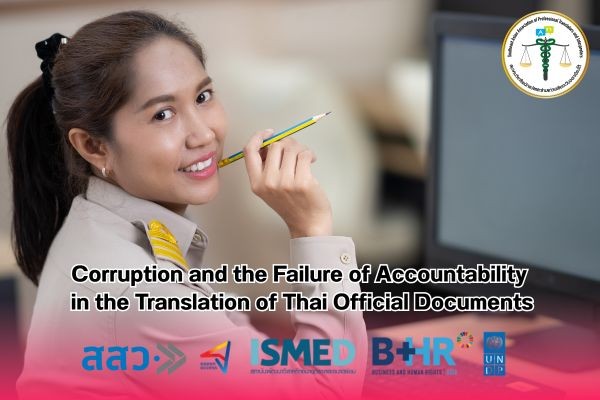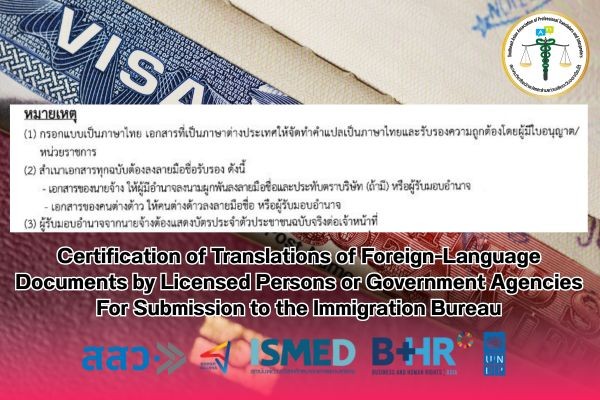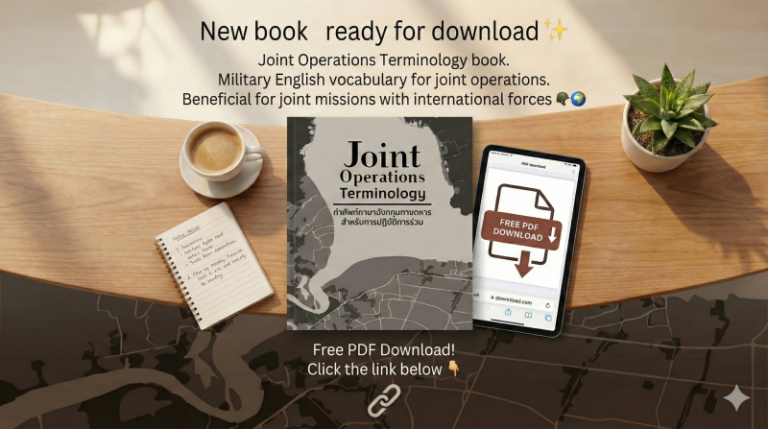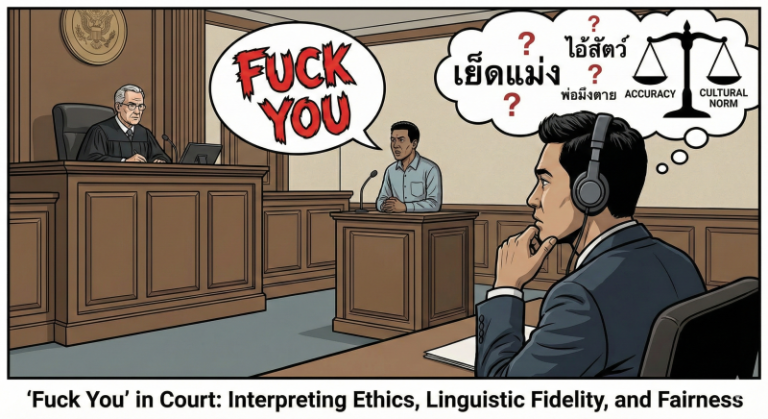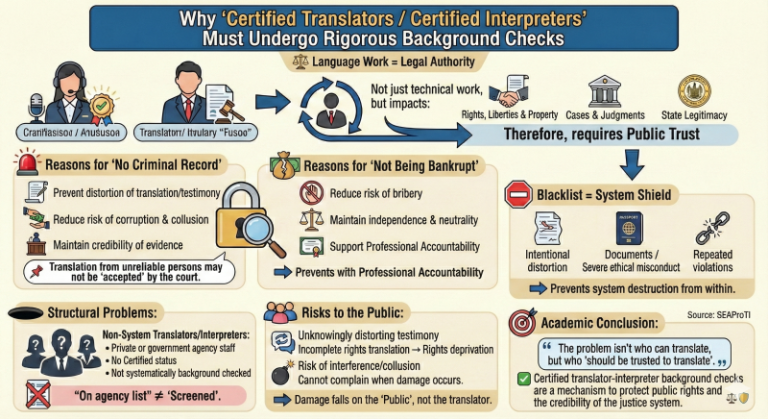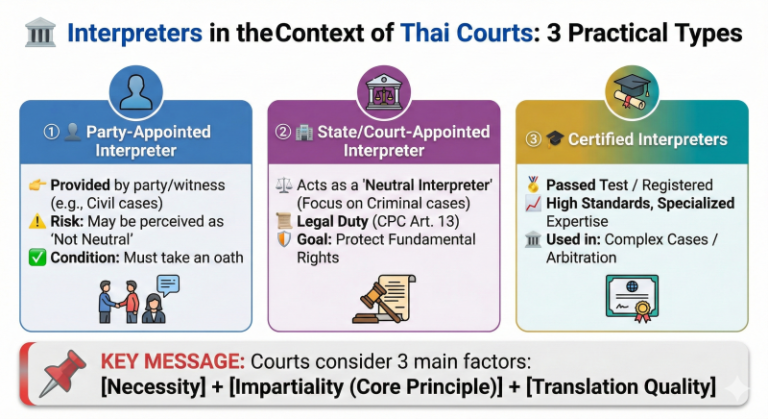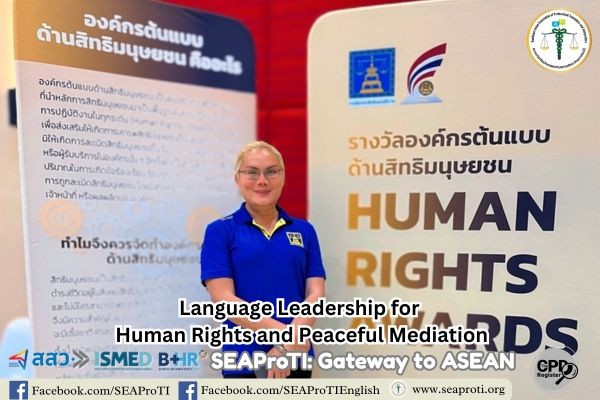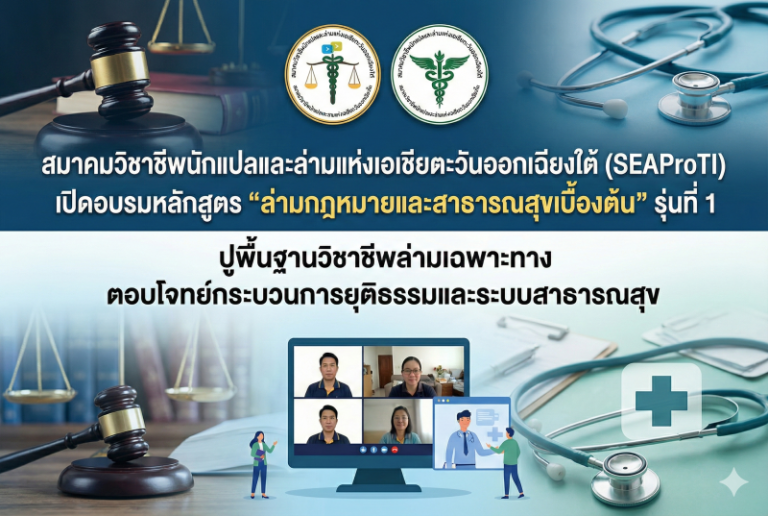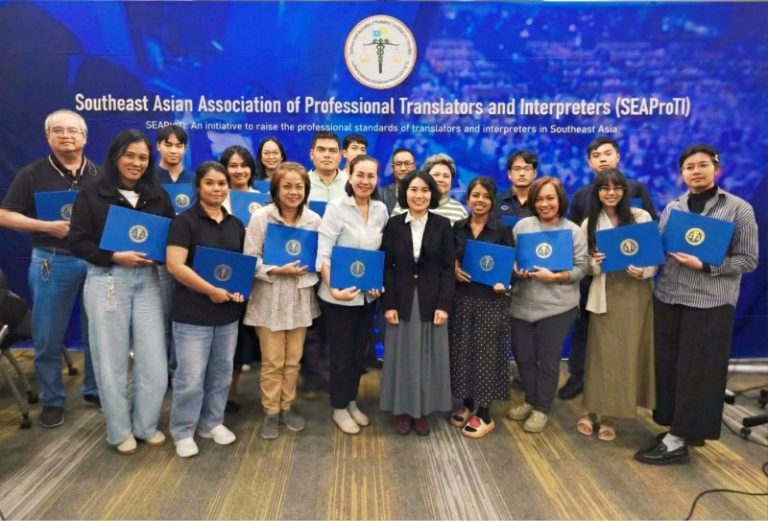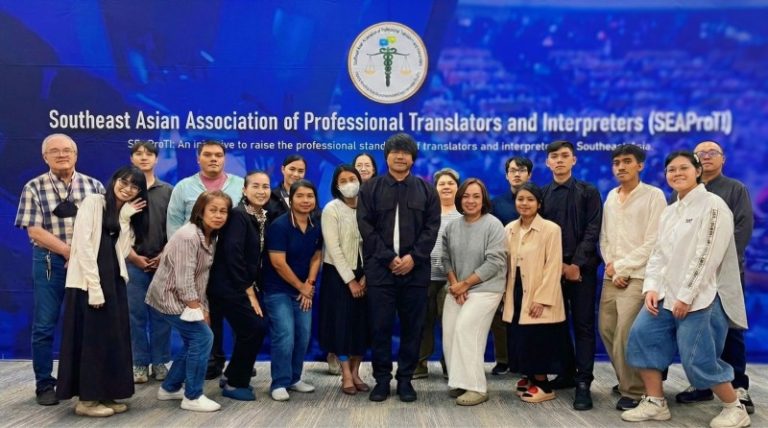Corruption and the Failure of Accountability in the Translation of Thai Official Documents
August 16, 2025, Bangkok – This article analyzes corruption in the translation of Thai government documents, particularly monopolistic practices, commission payments, and the use of translation to distort information in legal or business-related documents. It also highlights the absence of accountability mechanisms among state agencies and translators. When translation errors occur, the common practice is to seek another translator to redo the translation or to testify again, rather than investigating the original cause of the error. This has resulted in a culture of “impunity” within the bureaucracy. The article proposes reforms, including the establishment of standardized certification for translators, the creation of independent monitoring mechanisms, and the imposition of disciplinary and legal sanctions.
Keywords: corruption, government document translation, accountability, good governance
Introduction
The translation of government documents is critical to the protection of citizens’ rights and public trust in state institutions. However, in Thailand, translation has often become a locus of corruption, manifested in monopolistic allocation of contracts, commission payments to officials, and deliberate distortion of translated content (Thanes, 2021). These practices reflect both structural deficiencies and the lack of effective accountability mechanisms.
Forms of Corruption in Government Document Translation
Monopolistic Practices and Conflicts of Interest
- Certain government agencies grant translation rights exclusively to selected institutions or companies, despite other qualified providers being available. Such favoritism is driven by conflicts of interest between officials and translation firms (Transparency International, 2022).
Commissions and Kickbacks
- Translation companies have in some cases paid commissions of up to 10% to officials responsible for handling translated documents (SEAProTI, 2025). This practice undermines the principle of fair competition and results in the selection of translators based on personal gain rather than professional merit.
Distortion through Translation
So-called “grey capitalists” (นายทุนสีเทา) or businessmen with vested interests have employed translation services to manipulate documents submitted to government bodies. Certain officials collude in this practice, gaining personal benefits in return (Stern, 2019).
The Accountability Gap
When mistranslations are discovered, corrective action typically involves:
- commissioning another agency to re-translate the document, or
- appointing a new translator to testify in court or administrative hearings.
Such measures allow the original agency or translator responsible for the error to evade scrutiny and avoid disciplinary or legal consequences. This perpetuates a culture of impunity, undermining both translation standards and public trust in government institutions (UNODC, 2020).
Implications for the Legal System and Society
- Unfairness in the judicial process: Mistranslated documents may cause citizens to lose the ability to defend their rights in court.
- Declining professional standards: Translators who perform poorly remain in the system unchallenged.
- Economic and social damage: Kickbacks and commissions create unnecessary fiscal burdens for the state.
- Distorted global perceptions: Diplomatic or business documents deliberately mistranslated can harm Thailand’s international relations.
Reform and Policy Recommendations
- Establish uniform certification standards – Require Certified Translators/Interpreters accredited by an independent professional body.
- Implement transparent procurement (e-bidding) – Reduce monopolistic control and informal lobbying.
- Create independent review committees – Expert panels to assess translation accuracy and identify accountability.
- Enforce clear sanctions – Hold negligent translators or agencies accountable through disciplinary and legal measures.
- Promote a culture of transparency – Provide ethics and governance training for translators and officials alike.
Conclusion
Corruption and impunity in the translation of Thai government documents extend beyond linguistic quality and reflect deeper structural flaws in governance. Without reform and robust accountability, official translations will remain vulnerable to corruption, distortions, and violations of citizens’ rights.
References
- SEAProTI. (2025). Report on Certified Translators and Interpreters in Thailand. Southeast Asian Association of Professional Translators and Interpreters.
- Stern, L. (2019). Forensic Linguistics and Legal Accountability. Oxford: Oxford University Press.
- Thanes, W. (2021). Structural Corruption in the Thai Bureaucracy. Bangkok: Thammasat University Press.
- Transparency International. (2022). Corruption Perceptions Index 2022. Retrieved from https://www.transparency.org
- UNODC. (2020). Accountability and Integrity in Public Sector Institutions. United Nations Office on Drugs and Crime.
About Certified Translators, Translation Certification Providers, and Certified Interpreters under SEAProTI
The Southeast Asian Association of Professional Translators and Interpreters (SEAProTI) has officially promulgated qualifications for individuals registered as Certified Translators, Translation Certification Providers, and Certified Interpreters. These criteria are published in Sections 9 and 10 of the Royal Thai Government Gazette, Office of the Secretariat of the Cabinet, Prime Minister’s Office, dated July 25, 2024, Vol. 141, Part 66 Ng, p. 100. The Royal Thai Government Gazette
SEAProTI is the first professional association in Thailand and Southeast Asia to establish a certification system for translators and interpreters.
Head Office: Baan Rajakru Building, 33 Room 402, Soi Phaholyothin 5, Phaholyothin Road, Phayathai, Bangkok 10400, Thailand
Email: hello@seaproti.com Telephone: (+66) 2-114-3128 (Business hours: Mon–Fri, 9.00–17.00)
การคอร์รัปชันและความล้มเหลวของความรับผิดชอบในการแปลเอกสารราชการไทย
16 สิงหาคม 2568, กรุงเทพมหานคร – บทความนี้วิเคราะห์ปัญหาการคอร์รัปชันในวงการการแปลเอกสารราชการไทย โดยเฉพาะการผูกขาดผลประโยชน์ การรับค่าคอมมิชชั่น และการใช้การแปลเพื่อบิดเบือนข้อมูลในเอกสารที่เกี่ยวข้องกับคดีหรือธุรกรรมทางกฎหมาย อีกทั้งยังสะท้อนถึงการขาดกลไกความรับผิดชอบ (accountability) ของหน่วยงานและผู้แปล เมื่อเกิดความผิดพลาดมักมีการหาผู้แปลรายใหม่มาแก้ไขหรือเบิกความซ้ำ แทนที่จะตรวจสอบต้นตอความผิด ส่งผลให้เกิดวัฒนธรรม “ลอยนวลพ้นผิด” ในระบบราชการ บทความเสนอแนวทางปฏิรูป ได้แก่ การกำหนดมาตรฐานกลางของผู้แปล การสร้างกลไกตรวจสอบอิสระ และการกำหนดบทลงโทษทางวินัยและกฎหมายอย่างจริงจัง
คำสำคัญ: คอร์รัปชัน, การแปลเอกสารราชการ, ความรับผิดชอบ, ธรรมาภิบาล
บทนำ
การแปลเอกสารราชการเป็นกระบวนการที่มีความสำคัญต่อสิทธิของประชาชนและความเชื่อมั่นต่อรัฐ แต่ในบริบทของประเทศไทย การแปลมักถูกใช้เป็นพื้นที่หนึ่งของการคอร์รัปชัน ทั้งในรูปแบบการผูกขาดการแปล การจ่ายค่าคอมมิชชั่นให้เจ้าหน้าที่ และการแปลเพื่อบิดเบือนเนื้อหาเอกสาร (ธเนศ, 2564) ปัญหาเหล่านี้สะท้อนถึงความล้มเหลวในการจัดการเชิงโครงสร้างและการขาดกลไกตรวจสอบความรับผิดชอบ
รูปแบบของการคอร์รัปชันในการแปลเอกสารราชการ
การผูกขาดและผลประโยชน์ทับซ้อน
- หน่วยงานราชการบางแห่งเลือกให้สิทธิแก่สถาบันหรือร้านแปลเพียงบางราย โดยมีผลประโยชน์ทับซ้อนระหว่างผู้มีอำนาจและผู้ประกอบการ (Transparency International, 2022) ทำให้ผู้แปลที่มีคุณสมบัติเหมาะสมแต่ไม่มีเส้นสายถูกกีดกันออกจากระบบ
ค่าคอมมิชชั่นและสินบน
- มีกรณีที่บริษัทแปลจ่ายค่าคอมมิชชั่นสูงถึง 10% ให้เจ้าหน้าที่ผู้รับผิดชอบงานเอกสาร (SEAProTI, 2025) ทำให้การคัดเลือกผู้แปลไม่ได้อิงมาตรฐานคุณภาพ แต่ขึ้นอยู่กับผลประโยชน์ใต้โต๊ะ
การแปลเพื่อบิดเบือนเนื้อหา
- กรณี “นายทุนสีเทา” หรือผู้ประกอบการที่ใช้บริการแปลเพื่อตบตาหน่วยงานรัฐ สะท้อนถึงการใช้ภาษาเป็นเครื่องมือบิดเบือนข้อมูล โดยมีเจ้าหน้าที่บางรายยอมสมยอมเพื่อแลกกับผลประโยชน์ส่วนตน (Stern, 2019)
ความล้มเหลวของความรับผิดชอบ (Accountability Gap)
แม้จะมีการตรวจพบการแปลผิดพลาด แต่กระบวนการแก้ไขในทางปฏิบัติมักเป็นเพียงการ
- ให้หน่วยงานอื่นแปลใหม่ (re-translation)
- ให้ผู้แปลรายอื่นมาเบิกความใหม่ในศาลหรือกระบวนการพิจารณา
วิธีการนี้ทำให้ หน่วยงานที่ทำผิดเดิมไม่ถูกตรวจสอบ และไม่ต้องรับผิดทางวินัยหรือกฎหมาย ส่งผลให้เกิดวัฒนธรรม “ลอยนวลพ้นผิด” ซึ่งบั่นทอนมาตรฐานการแปลและทำลายความเชื่อมั่นของสังคมต่อรัฐ (UNODC, 2020)
ผลกระทบต่อระบบกฎหมายและสังคม
- ความไม่เป็นธรรมในกระบวนการยุติธรรม: เอกสารแปลผิดอาจทำให้ประชาชนเสียสิทธิในการต่อสู้คดี
- มาตรฐานวิชาชีพตกต่ำ: ผู้แปลที่ทำผิดพลาดยังคงอยู่ในระบบเพราะไม่ถูกตรวจสอบ
- ความเสียหายทางเศรษฐกิจและสังคม: ค่าคอมมิชชั่นและสินบนทำให้รัฐสูญเสียงบประมาณโดยไม่จำเป็น
- การบิดเบือนข้อมูลต่อสังคมโลก: เมื่อเอกสารทางการทูตหรือธุรกิจถูกแปลผิดโดยเจตนา อาจทำให้ความสัมพันธ์ระหว่างประเทศเสียหาย
แนวทางแก้ไขและปฏิรูป
- กำหนดมาตรฐานกลางของผู้แปล เช่น การบังคับใช้ระบบ Certified Translators/Interpreters โดยองค์กรวิชาชีพอิสระ
- ใช้ระบบ e-bidding และเปิดเผยข้อมูลสาธารณะ เพื่อป้องกันการล็อบบี้และผูกขาด
- ตั้งคณะกรรมการตรวจสอบอิสระด้านการแปล เพื่อวิเคราะห์ความถูกต้องของงานแปลและชี้มูลความผิดได้อย่างโปร่งใส
- กำหนดบทลงโทษชัดเจน ต่อผู้แปลหรือหน่วยงานที่บกพร่องทั้งในด้านวินัยและกฎหมาย
- สร้างวัฒนธรรมความโปร่งใส ผ่านการอบรมเจ้าหน้าที่และนักแปลเรื่องจริยธรรมวิชาชีพและธรรมาภิบาล
บทสรุป
ปัญหาการคอร์รัปชันและการลอยนวลพ้นผิดในการแปลเอกสารราชการไทยไม่ใช่เพียงเรื่องของคุณภาพงานแปล แต่เป็นปัญหาเชิงโครงสร้างที่เกี่ยวพันกับธรรมาภิบาลของรัฐ หากไม่มีการปฏิรูปและสร้างกลไกความรับผิดชอบที่โปร่งใส งานแปลราชการจะยังคงเป็นพื้นที่ของการทุจริตและการละเมิดสิทธิประชาชนต่อไป
เอกสารอ้างอิง
- ธเนศ วงศ์ยี่สุ่น. (2564). คอร์รัปชันเชิงโครงสร้างในระบบราชการไทย. กรุงเทพฯ: มหาวิทยาลัยธรรมศาสตร์.
- SEAProTI. (2025). Report on Certified Translators and Interpreters in Thailand. Southeast Asian Association of Professional Translators and Interpreters.
- Stern, L. (2019). Forensic Linguistics and Legal Accountability. Oxford: Oxford University Press.
- Transparency International. (2022). Corruption Perceptions Index 2022. Retrieved from https://www.transparency.org
- UNODC. (2020). Accountability and Integrity in Public Sector Institutions. United Nations Office on Drugs and Crime.
เกี่ยวกับนักแปลรับรอง ผู้รับรองการแปล และล่ามรับรองของสมาคมวิชาชีพนักแปลและล่ามแห่งเอเชียตะวันออกเฉียงใต้
สมาคมวิชาชีพนักแปลและล่ามแห่งเอเชียตะวันออกเฉียงใต้ (SEAProTI) ได้ประกาศหลักเกณฑ์และคุณสมบัติผู้ที่ขึ้นทะเบียนเป็น “นักแปลรับรอง (Certified Translators) และผู้รับรองการแปล (Translation Certification Providers) และล่ามรับรอง (Certified Interpreters)” ของสมาคม หมวดที่ 9 และหมวดที่ 10 ในราชกิจจานุเบกษา ของสำนักเลขาธิการคณะรัฐมนตรี ในสำนักนายกรัฐมนตรี แห่งราชอาณาจักรไทย ลงวันที่ 25 ก.ค. 2567 เล่มที่ 141 ตอนที่ 66 ง หน้า 100 อ่านฉบับเต็มได้ที่: นักแปลรับรอง ผู้รับรองการแปล และล่ามรับรอง
*สมาคมวิชาชีพนักแปลและล่ามแห่งเอเชียตะวันออกเฉียงใต้ เป็นสมาคมวิชาชีพแห่งแรกในประเทศไทยและภูมิภาคเอเชียตะวันออกเฉียงใต้ที่มีระบบรับรองนักแปลรับรอง ผู้รับรองการแปล และล่ามรับรอง
สำนักงานใหญ่: อาคารบ้านราชครู เลขที่ 33 ห้อง 402 ซอยพหลโยธิน 5 ถนนพหลโยธิน แขวงพญาไท เขตพญาไท กรุงเทพมหานคร 10400
อีเมล: hello@seaproti.com โทรศัพท์: (+66) 2-114-3128 (เวลาทำการ: วันจันทร์–วันศุกร์ เวลา 9.00–17.00 น.)


